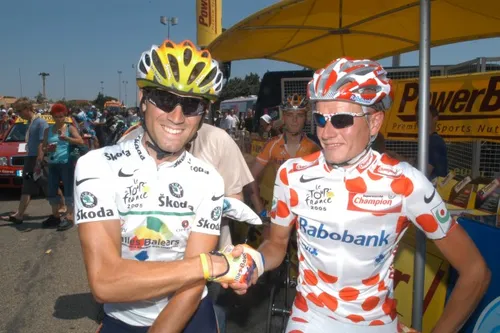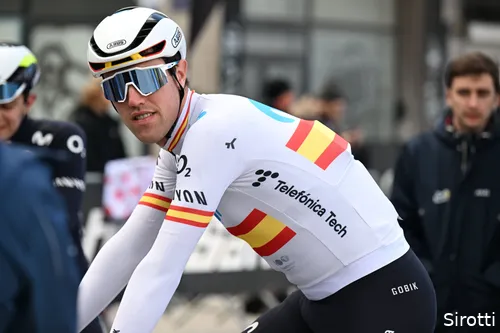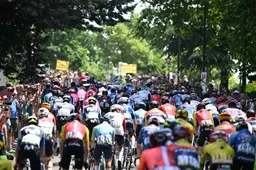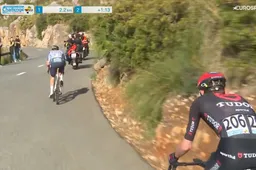Michael Rasmussen targets Red Bull–BORA over Lazkano case: "Only two scenarios are possible"
WielrennenSaturday, 01 November 2025 at 12:00

We finally know why Oier Lazkano hasn’t raced since Paris–Roubaix, although the UCI’s news was anything but cheerful. The 25-year-old Spaniard has shown abnormalities in his biological passport—spread across no fewer than three seasons. Red Bull–BORA–hansgrohe immediately suspended him, but Michael Rasmussen is questioning that decision.
ADVERTISEMENT
The 51-year-old Dane knows a thing or two about whereabouts. A doping affair involving Rasmussen exploded during the 2007 Tour de France, a race he seemed on course to win. Riding for Rabobank, he wore the yellow jersey and had taken multiple mountain stages. Yet on 25 July—right before Paris—his team pulled him from the race and fired him.
Not for a positive test, but for lying about his whereabouts during anti-doping checks: he’d said he was training in Mexico, but was actually in Italy. Rasmussen later admitted he had used doping for years—EPO, growth hormone and blood transfusions—over the period 1998–2010, with a full confession in 2013. That saga is often viewed as emblematic of the era’s widespread doping.
ADVERTISEMENT
Read more below the photo!

Michael Rasmussen (right)
Rasmussen goes after Red Bull–BORA over the Lazkano transfer
ADVERTISEMENT
What exactly was wrong in Lazkano’s biological passport hasn’t been made public. It is notable, however, that Movistar—Lazkano’s former team between 2022 and 2024—also had Brazilian rider Vinícius Rangel under contract in that period; he was suspended after whereabouts issues. Movistar has formally denied any involvement regarding Lazkano’s case.
On X, Rasmussen didn’t go after Movistar but rather targeted Red Bull–BORA–hansgrohe. The German team cut ties with Lazkano after the UCI announcement, but Rasmussen believes the team should have conducted better due diligence. "There are, to the best of my conviction, only two possible scenarios", he wrote.
Read more below the photo!

Oier Lazkano
“Maybe more than just Lazkano”: Rasmussen’s two scenarios
ADVERTISEMENT
“I am assuming that Red Bull–BORA–hansgrohe, as a matter of course, requested Lazkano’s medical file before signing the contract. So in the first scenario the team doctors were not competent enough to recognise suspicious signals, which would be a problem in itself.”
“The second scenario? Those same doctors were able to spot suspicious signals, but trusted that the ITA/UCI would not act. That would be an even bigger problem, because it opens up an entirely new risk: that multiple riders, with the team’s knowledge, could be racing with abnormal blood values.”
There are quite a few assumptions being made here, but according to Rasmussen it is striking that the UCI referred to a period from 2022 through 2024 when it came to the irregularities in Lazkano’s biological passport. "A process of three years is very long."
Read also
IDL-productions

Vacancy: Growth Editor IDL Procycling - (native) English

Thibau Nys: “I don’t think World Championship was among Mathieu van der Poel’s best 10 days this winter”

Cyclo-cross king Van der Poel adds record eighth world title in Hulst — after a flat tyre on the way to the race

“Quite intimidating,” smiles silver medalist Tibor Del Grosso after his “cool first World Championship among the pros” in Hulst

Hours after her World Championship victory, Lucinda Brand shares inspiring words about her title, her mother, Van Empel, and her future goals
Latest Cycling News

Vacancy: Growth Editor IDL Procycling - (native) English

Thibau Nys: “I don’t think World Championship was among Mathieu van der Poel’s best 10 days this winter”

Cyclo-cross king Van der Poel adds record eighth world title in Hulst — after a flat tyre on the way to the race

“This is the new cycling,” sighs runner-up after Evenepoel’s Mallorca statement ride

“Quite intimidating,” smiles silver medalist Tibor Del Grosso after his “cool first World Championship among the pros” in Hulst
Popular Cycling News

“This is the new cycling,” sighs runner-up after Evenepoel’s Mallorca statement ride

Hours after her World Championship victory, Lucinda Brand shares inspiring words about her title, her mother, Van Empel, and her future goals

Three from three for Remco Evenepoel as he completes Mallorca hat-trick in style

Thibau Nys: “I don’t think World Championship was among Mathieu van der Poel’s best 10 days this winter”

Cheeky Dane leaves Brennan and Visma | Lease a Bike hurting again in Australian finale: “I sounded like a girl!”
Latest Comments
- Nice!Bea22-01-2026
- Those events are mental rest for him. Fun, without expectations. *Sagan lost his abilities because he gained weight and got lazy. Pogi will likely retire before that has a chance at happening.Veganpotter14-12-2025
- Ah, the consequences of riding for Israel.Veganpotter11-12-2025
- Pidcock could follow everyone but Pogi while finishing 3rd. No second place rider this season😃Veganpotter16-11-2025
- Now the Palestinian protestors can stop their whining. Trump came to the rescue. So they can now STFU and go back to waving the rainbow flags.raufus15-10-2025
- Cracked the code lol. If it was that easy to 'crack the code' jonny Vegas would be charging up the Kwaremont giving Pog a dose of his medicine. Evenepoel can't match pog on a climb and neither can mvdp. Anything with a half difficult climb and Pog smashes the field. Even on flat(ish)parcours like Roubaix it came down to a mistake and crash by pog to definitively crown mvdp. MSR is the only one that Pog probably won't win.kevpt10-10-2025
- We've seen this movie before. I think Pogacar is doping.DeadBlow10-10-2025
- 👍Bea08-10-2025
- 👌🏻Bea08-10-2025
- What the data doesn't show is how much of an effect drafting had for evenepoel. Pogacar went with del toro at 100km whilst Evenepoel was still in the bunch. Despite the bike changes he still had a lot of assistance getting back to the bunch. Pogacar then rode 60km solo whilst evenepoel rode with Healy/Skjelmose until going solo in thd last 10-15km. Thats ~20% less power / energy requirements for 45-50km. Apples and oranges...kevpt30-09-2025
Loading

